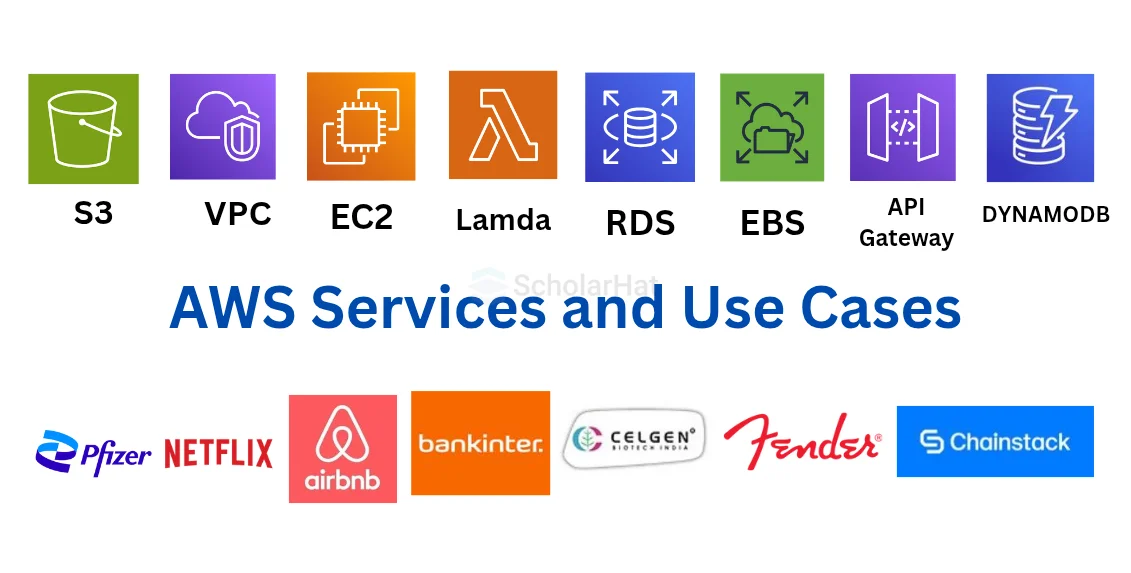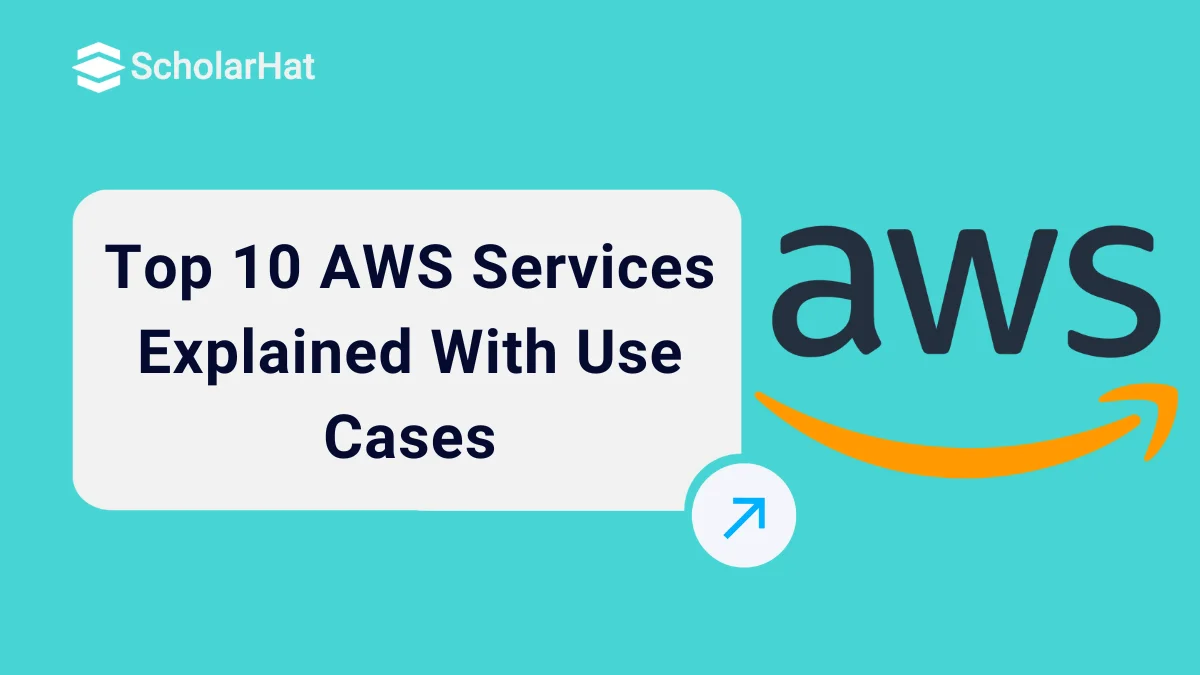15
FebTop 10 AWS Services Explained With Use Cases
Top 10 AWS Services Explained With Use Cases
Introduction
Amazon Web Services (AWS), serves as one of the most extensive and widespread Cloud service companies in the software industry. AWS has provided more than two hundred fully functional services from different data centers all over the world. The services are used by a wide range of clients across different industries to bring down installation costs, become a little more adaptable, and make operations quick. Pertaining to one latest study, AWS is the biggest Cloud service provider, budgeting for 32% of the worldwide Cloud computing businesses. AWS handles and maintains hardware and infrastructure for organizations and individuals, saving them expenditures such as investment in operating resources, and software infrastructure. These resources can be accessed for free or on payment. This article includes AWS use cases as well.
AWS Services
Services stand for on-demand solutions that are executed on the cloud. These services are cost-effective and scalable. AWS services range from basic storage and computation to more specialized applications such as streaming media, robotics,
and quantum computing. The services are implemented with the help of use cases. A use case is a written description of how the website users will complete the proposed tasks. It basically describes the behavior of a system as it responds to a request from the perspective of a user. Each use case is depicted by a series of simple steps that initiate with the user goal and end when that is accomplished.
Applications of AWS
The major applications of AWS include software infrastructure for Enterprises, Big Data solutions, Social Networking, developing and maintaining websites, developing mobile apps, game development, backup, and storage. It can be clearly understood from the Google Trends graph that worldwide usage (including migration) of the services of AWS is enormously growing very quickly.
AWS Use Cases
AWS use cases are written descriptions of how the website users will complete tasks. It describes the behaviour of a system as it responds to a request from the perspective of a user. Each use case is depicted by a series of simple steps that initiate with the user goal and end when that is accomplished. The use cases describe how various services are deployed and executed in various enterprise-based applications.

Top 10 Services and Use Cases
Here is a list of the top ten services and their deployment in different companies.
DynamoDB
AWS DynamoDB is a NoSQL database service that is well organized to carry out database functions. It does not require any operations such as database administration functions. It automatically distributes the tabular form of data and traffic, across a sufficient number of servers to meet throughput and storage requirements. It assures reliability also.
AWS DynamoDB Use Cases
Netflix is an entertainment platform that originated in the United States but quickly expanded to so many nations and grew in popularity. With the sudden increase happened in the number of viewers, Netflix encountered scalability issues. As a matter of fact, Netflix chose AWS to solve the problem. Netflix asserts that it could handle the scalability issues easily once it began using services such as DynamoDB. A huge number of AWS server instances have been customized by Netflix for computing, serving as storage databases, and for operations such as predictive analysis, decision support, and video streaming.
Cassandra
It is a very powerful open-source distributed database system that can handle massive amounts of data spread across multiple server platforms. It can be quickly scaled to meet a spike in demand by implementing multi-node Cassandra clusters, and it can meet fault tolerant demands without even a single fault point. It is currently one of the most efficient NoSQL databases available.
AWS Cassandra Use Cases
Netflix is the best example of the use case of Amazon Cassandra. Along with DynamoDB, the AWS service Cassandra is deployed by Netflix. Netflix uses this service as a key infrastructure (database) component for its worldwide streaming process. This service supports a wide range of data structures.
Amazon EC2 service
Many financial companies such as banking services deployed the Amazon EC2 (Elastic Cloud Compute) to carry out complex computational tasks within a short period of time.
AWS EC2 Use Cases
Bankinter is one of the top ten industrial banks in Spain. The banking functions necessarily involve a large amount of complex computational operations. Hence they apparently started employing AWS. Bankinter implements Amazon Elastic Compute Cloud (EC2) to execute simulation models with flexible design and it acquired results in a short period of time. In the coming years, the focus of AWS use cases in financial services will expand.
AWS S3
Amazon S3 (AWS Simple Storage Service) is an object storage service that provides industry-leading adaptability, cost-effectiveness, scalability, reliability, easy accessibility of information, and best performance. A huge number of customers and industries can use this service to securely store any amount of data for any application including data lakes, cloud-based services, and mobile apps. Business companies can benefit from cost optimization, better management of the data, and customization with the best access control policies, to satisfy different demands.
AWS S3 Use Cases
Celgene is a multinational biopharmaceutical company that develops cancer and inflammatory treatment approaches. Celgene runs hundreds of Amazon EC2 instances for HPC workloads and uses Amazon S3 for long-term storage of Petabytes of Genomic data.
AWS Lambda
AWS Lambda is an event-driven and serverless computing service offered by Amazon Web Services. It is a stateless serverless system that enhances running the background tasks as efficiently as possible. Since it is a serverless system, no need to worry about tasks like deploying or managing the servers or instances. The developer can focus on the primary goal such as coding. The code is to be put into the AWS Lambda service. In response to the events, AWS Lambda generates whatever resources the code requires.
AWS Lambda Use Cases
Fender's implementations are suitable for AWS Lambda Use Cases. Fender Musical Instruments Corporation (FMIC, or Fender) is an American musical instrument and amplifier manufacturer. Fender manufactures acoustic guitars, bass amplifiers, and public address types of equipment. But its most well-known products are solid-body electric guitars and bass guitars. Fender deployed AWS Lambda in order to improve customer engagement and improve supply-chain efficiencies. The products from Fender such as Fender Play, Fender Tune, and Fender Tone apps, which help customers learn to play guitar, tune their instruments, and control digital amplifiers, are hosted on the services provided by AWS.
Amazon RDS
AWS RDS (Relational Database Service) is a collection of organized simple procedures to create database instances. These instances are compatible with multiple database engines such as SQL Server, PostgreSQL, and so on. This service provides methods to set up, scale up, and operate the relational database in the Cloud with a few simple steps.
AWS Database Use Cases
Airbnb is the appropriate example for AWS database use cases. Airbnb is a short-term homestay and experience marketplace that connects property owners and travelers to rent out a variety of environments around the world. The company collects travel experience data and other related information. Airbnb switched to Amazon Relational Database Service (Amazon RDS) because it streamlines many of the time-consuming administrative tasks associated with databases. Amazon RDS enables difficult tasks like replication and scaling to be completed with a simple API call or the AWS Management Console.
Amazon VPC (Virtual Private Cloud)
Amazon Virtual Private Cloud (Amazon VPC) allows arranging a logically separated section of the AWS Cloud from which one can launch AWS resources as per the allowed policies. This section will not be exposed to the public Cloud. This VPC creator service will have complete control over the virtual network infrastructure, including choosing the IP address range, creating subnets, and modifying Routing tables and Network Gateways.
Use Cases of VPC
Pfizer, a global leader in the pharmaceutical industry, had an issue with peak computing needs. The Amazon VPC (Virtual Private Cloud) was introduced in order to extend Pfizer's heavy computational software and systems to global standards. In addition, the Virtual Private Cloud assisted Pfizer in adapting to new issues by expanding computing capabilities beyond the functionality of its existing high-performance computing systems. As a result, Pfizer avoided investing in additional technological infrastructures and concentrated its efforts on other activities.
Amazon EBS
AWS EBS (Amazon Elastic Block Store) services are block storage services. It is analogous to hard drives in physical computers. EBS is primarily used for prolonged disk space by AWS EC2 instances. Even when EC2 (Elastic Cloud Compute) instances are terminated, the data on the EBS volume is still not lost. EBS volumes can be dynamically attached, detached, and scaled by means of EC2 instances. Users can choose between different types of EBS backups. These backups are SSD-backed storage or HDD-backed volumes based on their needs.
AWS EBS Use Cases
Chainstack is a leading provider of blockchain infrastructure. Using Chainstack nodes, blockchain applications can be created, executed, and scaled. To optimize effectiveness, Chainstack makes use of the Amazon Elastic Block Store (Amazon EBS). The company has a workflow that demands up to 20TB of backups. Amazon EBS is a reliable and consistent service that fulfills these requirements and allows them to sequence several requests per second. It never continued to fail.
Amazon Athena
AWS Athena is a real-time application service that supports standard SQL to apply on Amazon Simple Storage Service (Amazon S3). It reinforces interactive queries on the Cloud. With a set of simple processes at the AWS Management Console, Athena can be invoked at the Amazon S3 data and start running general queries that return results in a few seconds. The queries can be executed on AWS Athena thru REST API. The REST API is a set of resources and techniques integrated with other services like Lambda services and HTTP endpoints.
AWS Athena Use Cases
LiveIntent’s AWS implementations are relevant AWS Athena use cases. It is a technology company that creates web applications for marketing companies and publishing houses including full-service e-mail advertising services. They accomplish their marketing goals by employing this service for their business activities like application development, email composing, etc.
Amazon API Gateway
AWS API Gateway is the service that streamlines the creation and maintenance of stateful and stateless APIs. This service secures the stateless APIs, such as REST, and HTTP, as well as the stateful API like WebSocket API to any scale. It makes use of strong, adaptable authentication mechanisms to ensure security, such as AWS Identity and Access Management policies, Lambda authorizer functions, and Amazon Cognito user pools.
AWS API Gateway Use Cases
AWS implementations of the company, Zywave, Inc., are suitable AWS API Gateway use cases. It is a software company headquartered in the United States, that enables its SaaS products for financial companies and insurance brokers. The API enhances the development of solutions to access data, business logic, or functionality from backend services.
AWS PrivateLink
AWS PrivateLink allows establishing connections to certain services of AWS, services hosted by other AWS accounts also called endpoint services, and supported AWS Marketplace partner services thru private IP addresses in the VPC. The interface endpoints are created directly within the VPC, using elastic network interfaces and IP addresses from the subnets of the VPC.
AWS PrivateLink Use Cases
Textnow is a mobile application developer. Textnow's AWS implementations are acceptable AWS privatelink use cases. The company provides an instant messaging and calling platform that allows people to stay in touch with friends and family. TextNow chooses to believe that one-to-one conversation pertains to everybody. Textnow has provided customers in North America with free phone numbers as well as unlimited messages and calls. Advertising is the primary source of revenue for the company. When the COVID-19 pandemic struck in March 2020, many businesses began to cut their digital advertising budgets. Textnow used AWS private link for low-cost data transfer to generate revenue and gain back its status. Businesses can use AWS PrivateLink to establish private connectivity between virtual private clouds and AWS or on-premises services without exposing data to the public Internet. By securing traffic over a private network employing AWS Private Link services, TextNow increased data security and reduced data transfer fees by 93 percent.
Summary
AWS has introduced more than two hundred fully functional services. These services are used by various enterprises, and it implies that the features and services of AWS are really the best in the field of cloud computing. The various service functionalities have various goals. The developer can employ the services by examining the use cases to identify the features provided by a particular service. As per the analytics reports, the usage of AWS is rapidly growing.
Faqs
What is NoSQL?
A NoSQL (Not only SQL) database offers a method for storing and retrieving data without using the traditional approaches of tabular relations as used in relational databases. This approach uses other NoSQL models such as Document Database, Key-value Store, and so on. This approach was selected for its simple construction, high scalability, and abundant access controls.
What are stateful and stateless architectures?
A stateful architecture allows the user to store the state of each session for further use. The stored status is retrieved to provide a reference point for future transactions. The stateful protocol enhances the performance of the sessions as it stores information from the previous sessions that helps future transactions. Here in this case memory is included as a part of the server to store the data.
In stateless architecture, the stateless protocol neither stores nor refers to the previous transaction. This architecture does not use any additional resources. As a result, in some cases, some functions will not be carried out due to a lack of availability of information.
Take our Aws skill challenge to evaluate yourself!

In less than 5 minutes, with our skill challenge, you can identify your knowledge gaps and strengths in a given skill.










